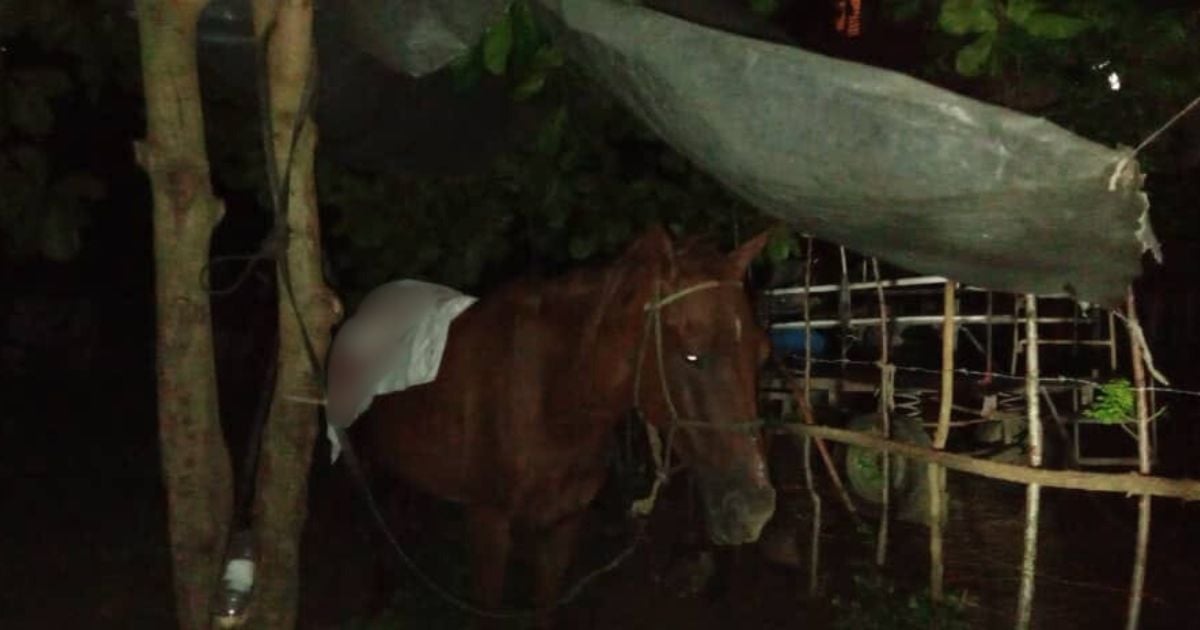A horse was gravely injured by machete attacks this Sunday in Sancti Spíritus, prompting a swift response from animal advocates who are now fighting to save its life. The ARCA Foundation in Sancti Spíritus reported on Facebook that the animal was attacked with machetes in the Olivos 3 neighborhood, emphasizing the need for all animal lovers to come together to save the severely injured horse.
Content Warning: This article contains graphic images that may be disturbing to some readers. The images show a wounded animal as part of a report on animal cruelty. Reader discretion is advised.
In a follow-up post, the organization clarified that the incident occurred during a brawl, which resulted in injuries to both the horse and its owner. “Our volunteers Yania, Disley, and Yamirna quickly arrived at the scene and provided first aid while waiting for veterinary assistance. They managed to insert an IV line and administered fluids, as the horse had lost a lot of blood,” stated ARCA.
Additionally, they reported that the deep wounds affected major arteries, causing significant blood loss, which was contained thanks to the quick intervention of several healthcare professionals. According to ARCA, the owner of the animal refused to have it euthanized, despite some onlookers suggesting it, and currently, the horse is stable, standing, and eating.
While the machete-attacked horse shows signs of recovery, its life remains in jeopardy. The animal protection organization urgently requested on Facebook this Monday for anti-inflammatory medications suitable for horses, suggesting the use of Miloxicam as an alternative if other drugs are unavailable. This appeal was directed to all veterinarians in the province, urging them to spread the message to obtain the medication as quickly as possible, highlighting the urgency of the needed assistance.
The incidents and complaints highlighting the lack of animal protection in Cuba underscore the regime’s unwillingness to provide adequate care. In August, animal protector Yenney Caballero denounced another case of animal cruelty in San José de las Lajas, Mayabeque, where horses used to pull carriages are forced to stay under the sun, loaded with heavy burdens, while their owners rest in the shade.
Caballero stated on Facebook that she witnessed firsthand the sad reality of these animals: while their caretakers shelter in the shade, chatting and laughing, the horses remain under the scorching sun, emaciated and with their heads hung low, burning like slaves.
This is not the first time activists have denounced such mistreatment on social media, which, however, takes on different nuances in other locations. Last July, Cuban animal protectors reported on social media that, by police order in Varadero, Matanzas province, horse-drawn carriages used by tourists had to wait under the sun until rented, in an area devoid of trees or shelters providing shade.
Miriam Romero Nasiff reported in the Facebook group “Animal Protection Society in Cuba” that the police ordered carriage drivers to place the horses in an area under the intense sun, without any roof, trees, or awnings to offer shade.
Frequently Asked Questions about Animal Cruelty in Cuba
The following questions and answers provide additional context and insights into the ongoing issues of animal cruelty and the efforts of advocates to protect animals in Cuba.
What happened to the horse in Sancti Spíritus?
The horse was severely injured by machete attacks during a brawl in the Olivos 3 neighborhood, resulting in significant blood loss and deep wounds affecting major arteries.
How did ARCA Foundation respond to the incident?
ARCA Foundation volunteers quickly provided first aid, including inserting an IV line and administering fluids to the horse. They also issued an urgent request for anti-inflammatory medications suitable for horses.
What does the incident reveal about animal protection in Cuba?
The incident highlights the regime's lack of willingness to provide adequate protection for animals, as evidenced by multiple cases of abuse and neglect reported by activists.
